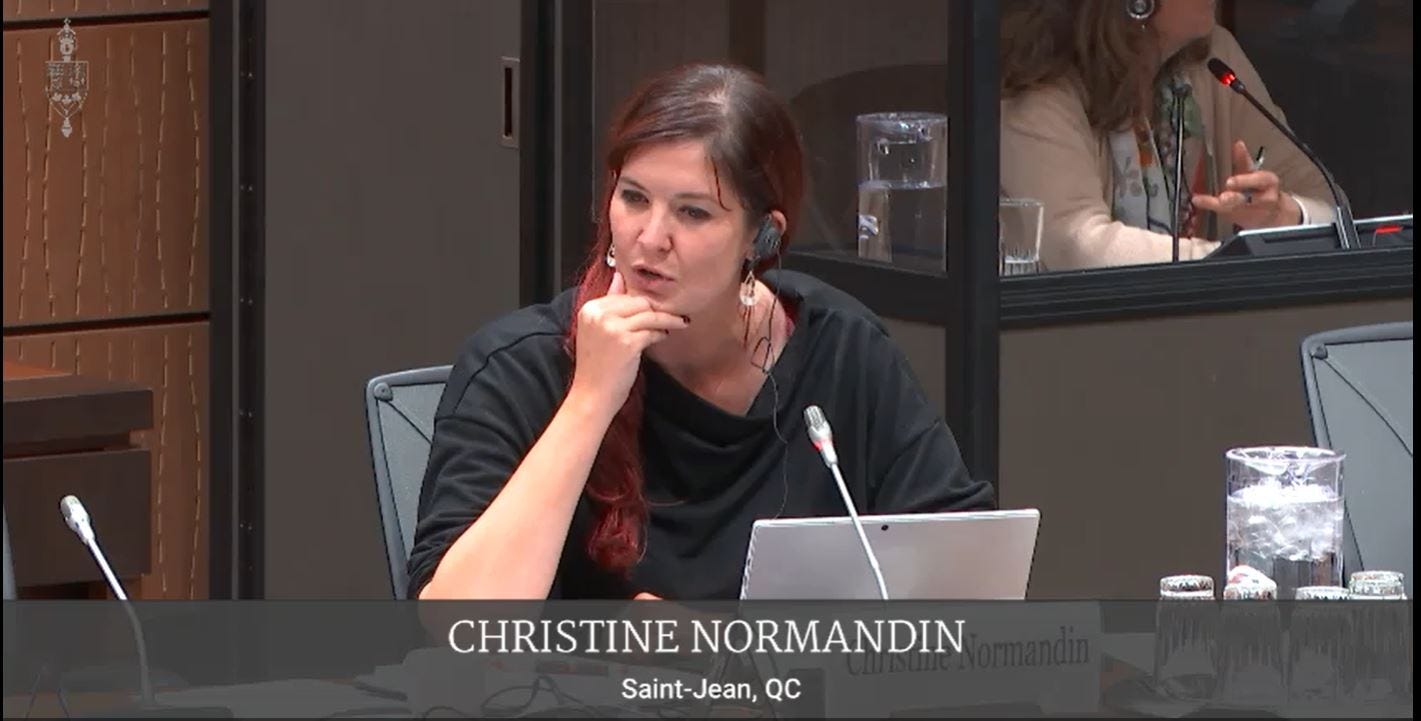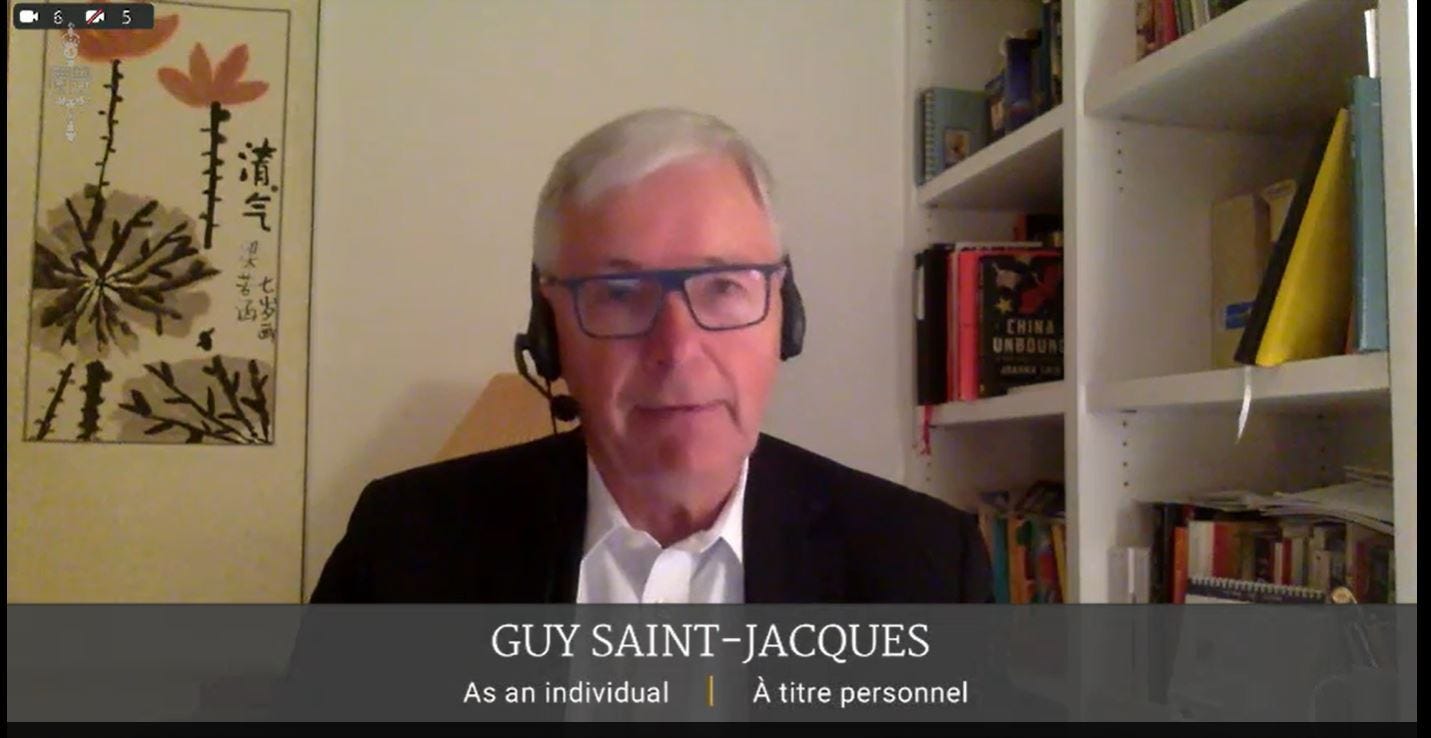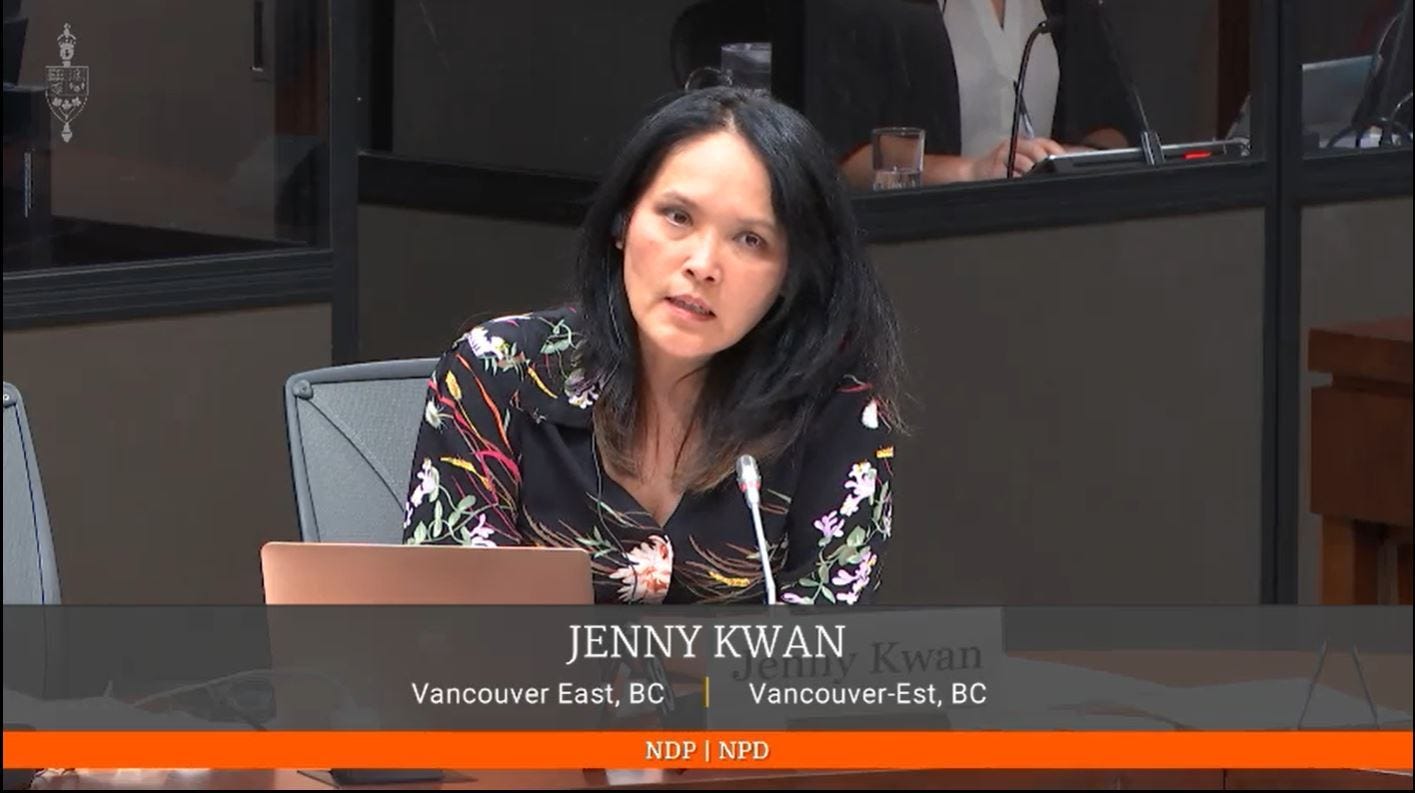Canada’s Parliament joins other middle powers in investigating China’s police stations overseas
And important takeaways for Canadian policy makers tackling China
Before we start today’s newsletter, we’d like to draw your attention to an excellent China-focused Substack, Discourse Power, by Tuvia Gering (陶文亚). Gering is a well-respected researcher on Chinese foreign policy with a focus on China-MENA relations. In his newsletter, he features and translates insightful discussions on China that you do not want to miss. Subscribe now if you haven’t already.
Last night, the Canada-China parliamentary committee voted unanimously for a motion that it will look into the three police stations operated by the Fuzhou Public Security Bureau of China in the Greater Toronto Area.
MP Michael Chong (Conservative, Ontario), when moving the motion at the end of a three-hour meeting, asked several parties to appear at future meetings related to the committee’s study of the matter. He named the Department of Public Safety’s minister and officials, the Royal Canadian Mounted Police (RCMP), the Canadian Security Intelligence Service (CSIS) as well as experts on police and intelligence.
At least three other middle-power governments, including Germany, Ireland and Spain have launched investigations into the matter.
After dodging questions about the police stations during the committee’s last meeting earlier this month, Weldon Epp, Director General with Global Affairs Canada, confirmed the RCMP was corroborating the allegations in the Safeguard Defenders report. Epp deferred any questions regarding the procedural details of the investigation, such as the expected timeline and whether results will be publicly announced, to the police.
One big question from multiple parliamentarians last night was what Canada needs to do in order to deal with the wide range of threats that China poses. The experts invited to share their opinion with the committee had lots to say, but here are some of the highlights:
More transparency and governmental collaboration to increase societal resilience
Foster international allies as a middle power
Become vigilant about China’s media infiltration
Before we get into more details, let’s introduce the experts:
Dr. Thomas Juneau, associate professor with the Graduate School of Public and International Affairs, University of Ottawa. He is also a former analyst for the Department of National Defence.
Vincent Rigby, visiting professor at Max Bell School of Public Policy, McGill University.
Rigby was appointed national security and intelligence advisor to Prime Minister Justin Trudeau in January 2020. Prior to this appointment, he was associate deputy minister of foreign affairs at Global Affairs Canada from August 2019 until January 2020, and associate deputy minister of Public Safety Canada from July 2017 until August 2019.
Jonathan Berkshire Miller, director and senior fellow, Indo-Pacific Program at Canadian think tank Macdonald-Laurier Institute.
If you enjoy what we do, please take a moment to share this link with a few coworkers and help us reach a greater audience.
More transparency and governmental collaboration to increase societal resilience
In Juneau’s five-minute opening remarks, he highlighted a report he co-authored with Rigby this spring titled A National Security Strategy for the 2020s. A large number of the recommendations and key findings from the report, he said, are directly or indirectly relevant to China.
Juneau eloquently put forward two suggestions for the policymakers to consider:
The need for a “whole-of-society response.”
Juneau: “The intelligence community cannot respond on its own. Of course, it has a central role to play but it needs to work with other partners in the federal government, economic departments and so on. But also with provincial governments, municipal governments, and the private sector. Think about economic espionage. And also civil society –think about in particular foreign interference with the Canadian Chinese diaspora. We need to do a much better job in this country, at this level, in the federal government's ability and willingness to lead, to coordinate, to share intelligence on threats and advice on how to deal with these threats.”
More transparency - defined more broadly as engagement, sharing information, and sharing insight on threats to Canadian civil society and the private sector in general.
Juneau: “The second recommendation I want to mention is on transparency. Our first line of defence against many of the threats posed by China and others for that matter is not always CSIS or the RCMP or CBSA. In many cases it is, but in other cases, its societal resilience, for example, against economic espionage or foreign interference. The target of these threats is not in most cases, the federal government itself. A lot of factors go into building societal resilience, we could have an entirely different discussion on that. But one of them is trust in government, which is a challenge in democracies today, including but not only in Canada, there's no magic recipe to build societal resilience but at the center of doing that has got to be transparency, more transparency.”
Rigby echoed Jeneau’s point, singling out the importance of collaboration between governments and the private sector.
Rigby: “......To re-emphasize the point because I think it's a really important one. This means other levels of government, the private sector, universities and research institutions which are under threat from foreign actors like never before. It's not just state-to-state anymore, individual Canadians can be impacted. Sharing information with the Canadians in a transparent fashion will be critical in making this happen.”
Answering a question posed by MP Christine Normandin (Bloc Québécois, Quebec), Rigby proposed a cabinet committee on national security chaired by the prime minister in order to form a cohesive system between different levels of government.
Normandin: “How can we improve this? Is there no direct way to ensure that there's no dichotomy between various departments?”
Rigby: “.....Again, we're a little out of step with respect to our Five Eyes allies and even the G7. We're the only country that doesn't have this type of committee, chaired by the prime minister. And we would like to think that if this committee were established, met on a regular basis— Prime Minister and key cabinet ministers in the national security public safety space getting regular intel briefs and dealing with issues every couple of weeks—that this would help solve some of the information sharing issues because you'd have a natural sort of vector, a place where all of this intel was ultimately going to land on the prime minister's desk with key ministers.”
Let’s take a break and introduce two more panellists:
Dr. David Curtis Wright, associate professor of history, University of Calgary.
Guy Saint-Jacques, senior fellow at China Institute of the University of Alberta and former ambassador to China.
If you want to know what other middle powers are doing about China, plug in your email and we will deliver the news to your inbox as it happens.
Foster international allies as a middle power
Canada’s diminishing global status
Saint-Jacques pointedly mentioned Canada’s waning international presence a few times during the meeting and blamed Ottawa’s foreign policy (or lack thereof) for being excluded from security alliances, such as AUKUS.
Saint-Jacques: “On the international stage, well, our place has shrunk. I think that this began under the Harper government and it continued unfortunately under Mr. Trudeau’s government.
The international questions are really related to domestic issues as well and if we don’t invest enough internationally, that, in turn, will turn against us. Before, Canada had a very active diplomacy and it had some added value and it was appreciated in Washington because we were able to interpret the opinions of developing countries. Thanks to our official development aid program, we had a lot of relationships with a lot of African countries and Haiti.
The fact that we had not been invited to join AUKUS and other fora as well shows perhaps that we’re paying the price for our years of negligence.”
Adding to his remarks on Canada’s shrinking power in the international community, Saint-Jacques said Ottawa is also looked down on by Beijing. He wondered whether Chinese diplomats would even be willing to engage with Canada.
“When I was in Beijing very often I had discussions where I was told that we were the lapdog of the United States. From the start of this sad episode with Mrs. Meng Wangzhou and the two Michaels, they said that we should not have listened to the extradition request. They showed total disregard for how extradition requests work and they just assumed that things could work in Canada as they work in China.”
Re-consider Canada’s interests in the Indo-Pacific
Miller (he’s the director of Macdonald-Laurier Institute’s Indo-Pacific program) suggested that Ottawa broaden the scope of the Indo-Pacific strategy beyond economic and investment aspects.
Miller: “We need to have that empathy with our partners. We can't just base a strategy purely on what we want. Of course, it needs to be premised on our interests, but it needs to take into account the empathy of our partners and what engagement they want from Canada.”
Strengthen, diversify trade ties with other allies
Saint-Jacques gave Canada points for its role in launching the Declaration Against Arbitrary Detention in State-to-State Relations last year. But he was dissatisfied with how much the government is doing in terms of “stabilizing” trade relations in the face of China.
Saint-Jacques: “We are at the point where we have to work with allies to try to develop common positions. To give you an example, there are very few countries that export barley, canola, or soya, wheat to China. So the next time that China wants to impose punitive sanctions on Australia on its barley, Canada and the U.S. would agree that they would not increase their exports above their historical share of the Chinese market. Immediately, that would send a message to China that the time where they were dividing is over.”
Find common grounds but with eyes wide open
While Canada needs to avoid being dependent on China, both Saint-Jacques and Rigby agreed that cooperating with China in some capacities is necessary. (Rigby is the visiting professor at McGill)
Rigby: “China likes nothing more than to divide and conquer. We need to stay together. Mr. Chairman, we live in a complex and dynamic world whereas the deputy prime minister said in a recent speech, we do have to find ways to coexist with competitors who do not share our values. This includes China where we can potentially find common ground on issues like climate change, and the management of pandemics, but we must do so with eyes wide open, clearly recognizing their strategic intent and be ready to respond both at home and abroad to threats to our interests and values.”
Become vigilant about China’s media infiltration
Responding to a question from Normandin, Saint-Jacques said Canada needs to work on countering China’s media influence.
Saint-Jacques: “China takes advantage of the fact that we’re an open society. There are Chinese dailies that take out full-page ads in our media and it’s impossible to do the same thing in China. There’s no reciprocity, so we have to be much more vigilant when it comes to that.”
MP Jenny Kwan (NDP, British Columbia) then asked Saint-Jacques to be more specific. He emphasized the importance of paying more attention to Chinese social media and suggested looking at the experience of other countries, Australia for example, that adopted laws to counter foreign interference
.
Saint-Jacques: “I was struck at the start of the Meng Wangzhou crisis. I gave many interviews to Canadian media that are publishing in Mandarin and the questions they were asking me - they were straight from Beijing. They didn’t know what the position of the Canadian government (is), they didn’t understand it. They were just reflecting the views from Beijing.”
Wright, on the other hand, seemed to downplay the long-lasting influence of these newspapers.
Wright: “Sometimes it’s disturbing. These are strangers on our land. Do they not understand how Canada works?
But those people are first-generation. Their kids and their grandkids are going to wind up thinking very very differently. A lot of the influence that we are so concerned about pertains to one generation.”
Canadian journalists who criticize the CCP are not safe, even at home. Canadian-Chinese journalist Victor Ho has been placed on a “wanted list” by Chinese security officials for allegedly violating China’s National Security Law. Kwan wanted to know what Canada should do to protect Canadian activists from being targeted by the Chinese law, which the CCP warned it would use in China and abroad.
Saint-Jacques: “The Canadian government should speak very forcefully on this subject to say that it will oppose any effort by China to use this national security law to try to get people.
Canadians fall under (this law). It’s easy to be found guilty. I would be found guilty. I have been very critical of China and what I fear is that China may want to use its extradition treaties with other countries and if I ever go to visit one of those countries, they could request that I be arrested and extradited to China … And this is another example where we have to work with our allies to develop common positions to push back on China.”







